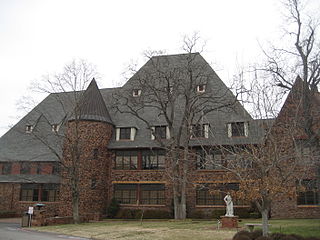
Bishop Kelley High School is an American Lasallian Catholic high school with 905 students, grades 9 to 12, located at 41st and Hudson Avenue, in the center of the Tulsa metropolitan area, on a campus spanning just over 47 acres (150,000 m2). The school is formerly a function of the Roman Catholic Diocese of Tulsa, but is now incorporated separately, and operates in the Lasallian tradition of the Brothers of the Christian Schools.

Cascia Hall Preparatory School is an Augustinian coeducational college preparatory day school in Tulsa, Oklahoma. It is a member of the Augustinian Secondary Education Association. It is one of Tulsa's three Catholic high schools, with Bishop Kelley High School and Holy Family Classical School.

The Diocese of Tulsa also called the Diocese of Tulsa and Eastern Oklahoma is a Latin Church diocese of the Catholic Church in the eastern part of Oklahoma in the United States. It is a suffragan diocese of the metropolitan Archdiocese of Oklahoma City.
St. Augustine Preparatory School is a private all-male Roman Catholic. college preparatory school located in the Richland section of Buena Vista Township, in Atlantic County, in the U.S. state of New Jersey. Located on 118 acres (0.48 km2) of wooded property, it serves students in eighth through twelfth grade from across South Jersey under the auspices of the Roman Catholic Diocese of Camden. The school has been accredited by the Middle States Association of Colleges and Schools Commission on Elementary and Secondary Schools since 1983 and the New Jersey Association of Independent Schools. St. Augustine was founded in 1959 by the Order of Saint Augustine as a minor seminary to help young men prepare for studies in the priesthood and religious life; the first class was a mixture of seminarians and day students. The school is a member of the Augustinian Secondary Education Association.
The Oklahoma Bible Academy (OBA) is an interdenominational Christian private school located in Enid, Oklahoma. OBA is the oldest coeducational private school in the state of Oklahoma.

Bishop McGuinness Catholic High School (McGuinness) is a college-preparatory secondary school located in Oklahoma City, Oklahoma, United States. It has an enrollment of 720 students in grades 9 through 12, is co-educational, and serves as part of the Archdiocese of Oklahoma City in the Roman Catholic Church.
Monte Cassino School is a Catholic elementary and middle school located in midtown Tulsa, Oklahoma. The school also included a girls' junior college until 1945 and a high school until 1986.
Woodhaven is a neighborhood at the corner of Interstate 30 and the Loop 820 East interchange in Fort Worth, Texas, United States. The neighborhood is bounded by the Trinity River to the north and the former CBS Channel 11 KTVT studios to the south. The Woodhaven Country Club, which has a clubhouse, a 6,543-yard, par 71, 18-hole golf course, a swimming pool, and tennis courts, is the center of the community.

St. Rita of Cascia High School is an all-boys Catholic high school located in the Ashburn neighborhood on Chicago's Southwest Side., United States. It is part of the Roman Catholic Archdiocese of Chicago, is operated by the Province of Our Mother of Good Counsel, a Catholic jurisdiction of the Order of Saint Augustine, and is a member of the Augustinian Secondary Education Association. The school is named for Rita of Cascia (1381–1457), an Italian Augustinian nun and Roman Catholic saint.
Many American sports team names and mascots are based upon or use religious symbolism. The majority are scholastic teams at institutions founded by various denominations of Christianity, both Catholic and Protestant. Saints is the most popular of these names not only at religious schools but public schools. However, the latter are often indirect, the schools being located in places named for saints. The only team name that has become controversial is Crusaders, many having changed in recent years. The term, once associated with protectors of the faith is now also associated with oppression. Many Christian schools use "Knights" as their team names with imagery similar to crusaders, but it is difficult to establish religious symbolism in these cases. There are also a number of teams whose name includes demons or devils, which are mythological creatures from many cultures. However, the devil imagery in sports used by professional sports teams as well as public and non-sectarian schools are an example of the Devil in the arts and popular culture more than religion. There are also a few team identities based upon Norse mythology in popular culture.

Austin Catholic Preparatory School was a boys, non–residential, college preparatory Catholic school in Detroit, Michigan. Austin was "one of the city's most widely respected schools." The school was founded in 1951 and operated by the Augustinians. Its first class graduated in 1956. Austin was closed in 1978 due to declining enrollment and a desire by the Augustinians to sell the school's property.
The Augustinian Secondary Education Association (ASEA) is an organization founded in 1986 to "foster unity, efficiency, and continued development within the Augustinian ministry to secondary education" in North America. It operates without a budget, acting as a forum for member institutions to share resources, implement Augustinian ideals in the curriculum of its institutions, and to ensure that its member institutions present an "authentic Augustinian identity". It is based in Ojai, California, and reports to the Federation of Augustinians of North America (FANA). Its activity consists of informal networking and inservice programs, as well as annual meetings.